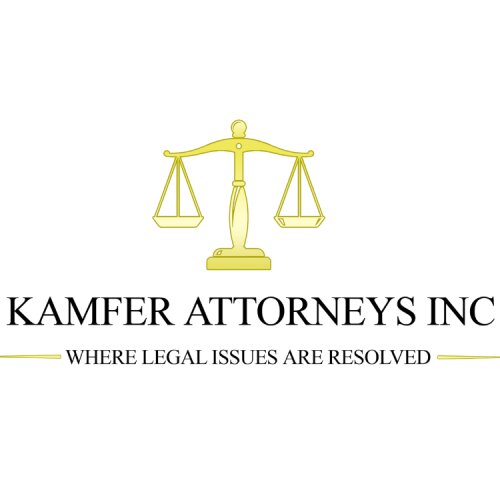Best Trusts Lawyers in South Africa
Share your needs with us, get contacted by law firms.
Free. Takes 2 min.
Or refine your search by selecting a city:
List of the best lawyers in South Africa
About Trusts Law in South Africa
Trusts in South Africa are legal arrangements where a person or entity, known as a trustee, holds assets on behalf of beneficiaries. Trusts serve various purposes including estate planning, asset protection, safeguarding assets for minors or individuals who cannot manage their own affairs, and facilitating family business succession. Trust law in South Africa is primarily governed by the Trust Property Control Act of 1988, which ensures that trusts are operated fairly and legally under strict judicial oversight.
Why You May Need a Lawyer
Engaging a lawyer for matters related to Trusts is crucial in several scenarios:
- Creation of Trust: Facilitating the drafting and establishment of a trust to ensure compliance with legal requirements.
- Dispute Resolution: Resolving conflicts between trustees and beneficiaries or among beneficiaries themselves.
- Trust Administration: Providing guidance in managing and administering the trust in accordance with its terms and the relevant legal framework.
- Tax Implications: Understanding and optimizing tax-related aspects associated with trusts.
- Legal Advice: Interpreting trust documents and providing counsel on the rights and obligations of trustees and beneficiaries.
Local Laws Overview
The foundational legal framework for trusts in South Africa is enshrined in the Trust Property Control Act. Key aspects include:
- Appointment of Trustees: Trustees must be formally appointed and are required to act in the best interests of the beneficiaries.
- Fiduciary Duties: Trustees have a fiduciary duty to manage the trust assets responsibly and transparently.
- Beneficiary Rights: Beneficiaries have the right to information about the trust and to compel trustees to perform their duties.
- Registration of Trusts: Although not mandatory, registering a trust can offer significant legal protection.
- Accountability: Trustees are accountable to both the beneficiaries and the Master of the High Court.
- Legal Requirements: Trust deeds must follow certain legal protocols and clearly outline the powers and limitations of trustees.
Frequently Asked Questions
What is a trust?
A trust is a legal arrangement where trustees hold and manage assets for the benefit of designated beneficiaries according to specific terms set out in a trust deed.
What types of trusts are common in South Africa?
Common trusts include inter vivos trusts (created during the lifetime of the founder) and testamentary trusts (created upon the founder's death through a will).
Who can be a trustee?
Any competent individual or entity, including a company, may be appointed as a trustee, provided they can carry out fiduciary responsibilities effectively.
How are trusts taxed in South Africa?
Trusts are taxed at a flat rate but income distributed to beneficiaries generally gets taxed in their hands, benefiting from their respective tax rates.
Can a trust be changed once established?
Trusts can sometimes be amended if provisions exist in the trust deed, but changes often require court approval to ensure the protection of beneficiaries.
What is the role of the Master of the High Court?
The Master of the High Court supervises trust administration, ensures compliance, and addresses disputes associated with trust matters.
What happens to a trust when the founder dies?
The trust continues to exist as per the trust deed's terms, though testamentary trusts are activated after the founder's death according to their will.
How are disputes within trusts resolved?
Disputes can be settled through mediation or litigation, and the Master of the High Court can intervene to enforce a fair outcome.
What is the difference between a discretionary and a vested trust?
In discretionary trusts, trustees decide beneficiary disbursements, while vested trusts assign specific entitlements to beneficiaries.
Is it mandatory to register a trust in South Africa?
Though not mandatory, registering a trust can provide legal clarity and enforceability in the maintenance of trust objectives.
Additional Resources
For more information and help regarding trusts, you may consider the following resources:
- Master of the High Court: Oversees trust administration and can provide guidance on procedural requirements.
- South African Revenue Service (SARS): For queries regarding taxation of trusts.
- Law Society of South Africa: Helpful for finding legal representatives specializing in trust law.
- Books and journals: Numerous publications discuss trust law intricacies for both laypersons and professionals.
Next Steps
If you require legal assistance concerning trusts, consider taking the following steps:
- Compile all relevant documents related to your trust needs or issues.
- Identify potential legal representatives by researching local attorneys or firms specializing in trusts.
- Schedule consultations with several lawyers to discuss your case and obtain estimated costs and strategies.
- Engage a lawyer whose expertise, approach, and fees align with your needs to assist with the intricacies of your trust-related matters.
Lawzana helps you find the best lawyers and law firms in South Africa through a curated and pre-screened list of qualified legal professionals. Our platform offers rankings and detailed profiles of attorneys and law firms, allowing you to compare based on practice areas, including Trusts, experience, and client feedback.
Each profile includes a description of the firm's areas of practice, client reviews, team members and partners, year of establishment, spoken languages, office locations, contact information, social media presence, and any published articles or resources. Most firms on our platform speak English and are experienced in both local and international legal matters.
Get a quote from top-rated law firms in South Africa — quickly, securely, and without unnecessary hassle.
Disclaimer:
The information provided on this page is for general informational purposes only and does not constitute legal advice. While we strive to ensure the accuracy and relevance of the content, legal information may change over time, and interpretations of the law can vary. You should always consult with a qualified legal professional for advice specific to your situation.
We disclaim all liability for actions taken or not taken based on the content of this page. If you believe any information is incorrect or outdated, please contact us, and we will review and update it where appropriate.
Browse trusts law firms by city in South Africa
Refine your search by selecting a city.















